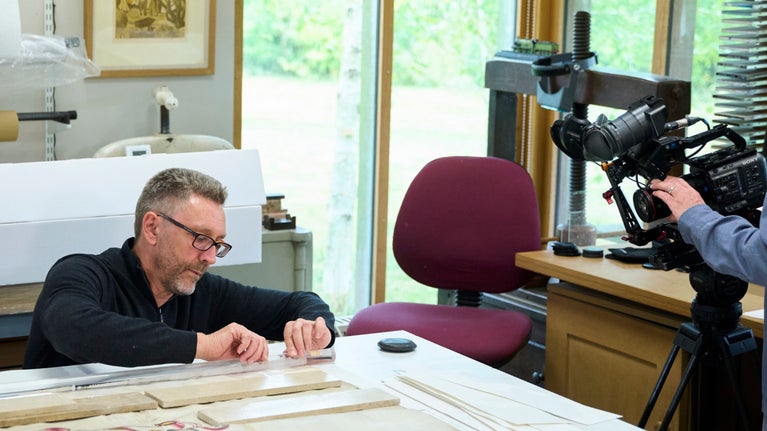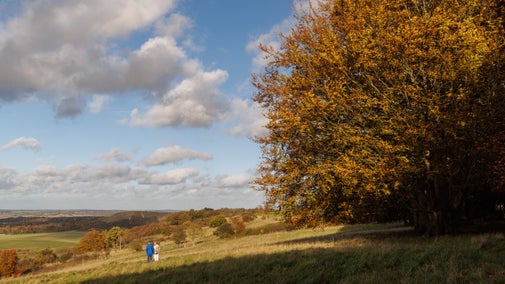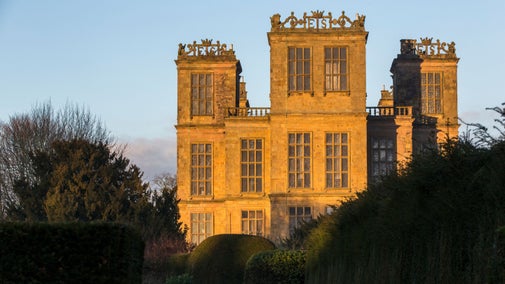
Stars of the screen
Find out which historic houses and dramatic landscapes you can see on-screen, from popular TV dramas to brand new films.

Several places we care for have helped to bring the world of Harry Potter to life on screen. Fans of the films can wander in the footsteps of Daniel Radcliffe, Emma Watson and Rupert Grint, and recreate the magic of the movies.
Harry Potter and Lacock Abbey will always be connected – this is where several scenes set at Hogwarts School of Witchcraft and Wizardry were filmed for the first two instalments in the series.
At this atmospheric country house in Wiltshire, you can challenge your friends to a wizard duel, play hide and seek in the grounds,or explore the medieval abbey cloisters used as corridors and classrooms of Hogwarts.
Lacock Abbey can also be spotted in Harry Potter companion series Fantastic Beasts: The Crimes of Grindelwald (2018).
Nearby, a cottage in the old village of Lacock served as the exterior of Harry’s childhood home at Godric’s Hollow, in the terrifying scene where Lord Voldemort killed Harry's parents in Harry Potter and the Philosopher’s Stone (2001).
The streets of Lacock village also stood in for the Muggle village of Budleigh Babberton where Harry and Dumbledore seek out Horace Slughorn in Harry Potter and the Half-Blood Prince (2009).
The historic village of Lavenham, in Suffolk, was also used to create Godric’s Hollow in Harry Potter and the Deathly Hallows Part 1 (2010). Lavenham Guildhall, a 16th-century, higgledy-piggledy timber-framed building, became Harry Potter’s parents’ derelict house on screen.
Freshwater West, six miles west of Stackpole in Pembrokeshire, was used for beach scenes in Harry Potter and the Deathly Hallows.
Shell Cottage was constructed here, which was Bill and Fleur Weasley’s home and a safe house during the Second Wizarding War, plus the setting of Dobby’s death. Shell Cottage was dismantled after filming, but visitors can still wander this atmospheric coastline from the movie.
Contrary to popular legend, a 400-year-old beech tree on the Ashridge Estate in Hertfordshire was not in fact used as the Whomping Willow. However, the estate did provide the setting for the Quidditch World Cup in Harry Potter and the Goblet of Fire (2005), when Harry and the Weasleys arrive in the woods via Portkey and encounter the Diggory family.
The tree that Cedric Diggory jumps down from was a distinctive, gnarled old specimen that stood in the Frithsden Beeches area of the estate. Sadly, in 2014, the tree split in two and lay sprawled across the common, but visitors can still visit the location and see what’s left of the grand old structure.
Hardwick Hall in Derbyshire was used to film the exterior scenes of Malfoy Manor, family home of Harry Potter’s nemesis Draco, of Slytherin house. It features in Harry Potter and the Deathly Hallows, with help from some CGI effects.
This is also where Lord Voldemort’s plans the Second Wizarding War and where Harry Ron and Hermione are taken by Snatchers after discovering Lord Voldemort’s Horcruxes.
As well as showing off beautiful locations, filming directly benefits the places that star in the production. The income from location fees goes straight back into conservation work to care for historic houses and landscapes, so that we’ll all be able to see them both on screen and in real life for years to come.

Find out which historic houses and dramatic landscapes you can see on-screen, from popular TV dramas to brand new films.
Fancy taking a break somewhere you've seen on screen? From The Secret Garden to Game of Thrones and Harry Potter, many of the places we care for have been filming locations for much-loved movies and TV shows.

Discover why the Abbey’s medieval Cloisters and the village’s timber-framed houses have made the perfect location for many TV and film productions.

Country house with monastic roots, once home to William Henry Fox Talbot, inventor of the photographic negative

Ancient trees, rolling chalk downlands and lush meadows in an area of outstanding natural beauty

Wild, sandy stretch adored by adventurous souls and nature lovers.

One of the most spectacular timber framed buildings of medieval England at the heart of village life

An Elizabethan masterpiece
